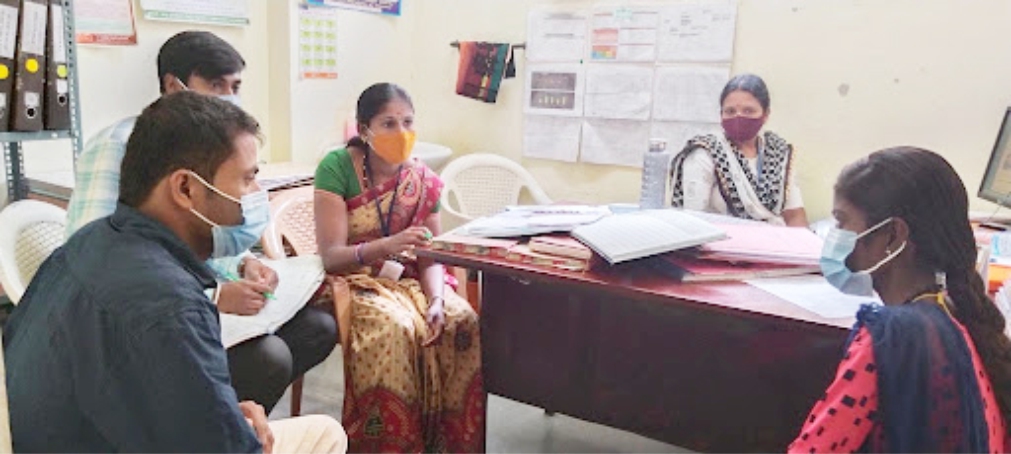National Tuberculosis Elimination Program (NTEP)
Started in 2003
Saragur, H D Kote
Building Human &
Social Capital
Family Centric
Approach
Complementing Institution & Community based interventions
Decrease mortality rate, control MDR TB conversion cases, control TB spread and increase cure rate in tribal and non tribal population
Retaining focus on long-term health goals
1314 Tribals screened for TB. 107 detected positive. Patients initiated on DOTS at Vivekananda Memorial Hospital and referred to other centres
Early detection, free treatment, awareness and screening camps have greatly reduced the burden of TB in tribal communities in H D Kote and Saragur taluk
Outcomes that demonstrate the strength of community health programs even during Pandemic
Treatment success rate comparable to leading developed nations
IMPACT STORY

Persistence against resistance
Radika, an 18-year-old girl from Nemmanahalli Hadi in the H.D Kote taluk, arrived with a fever and breathlessness. She tested positive for tuberculosis on December 15, 2021. While gathering information, we discovered that she was diagnosed with TB in 2019 and her father had also been infected.
She was initiated on TB treatment and the doctor recommended a strict food regimen and regular followup. Family screening and counselling were also carried out.
On December 16, 2021, the doctor recommended a thoracic scan, but Radika’s family couldn’t afford it. The
Yoghaskhema Samithi supported her through Patient Support Fund. Due to her deteriorating condition, she was transferred to the Emergency Ward after two days. Later, she was moved to the isolation ward on December 21, 2021. A pint of blood was also given to her. She was advised to be moved to PKTB hospital in Mysore, but she and her family refused to leave and insisted on staying in VMH to receive her medication.
On January 20, 2022, the physicians recommended that she could be discharged with the oxygen ventilator, but because they did not have a power facility at home, they remained in the hospital.
The SVYM team assisted the family in obtaining electricity for their home. She was discharged on January 27, 2022, and the hospital team continued to monitor her progress. Mamatha from the counselling department paid a visit to Radika’s home and provided her with medications following a brief health check.
Her health progressively improved, and she came to the hospital for regular check-ups on March 8, 2022,
and March 19, 2022. She is now able to support herself without the use of an oxygen ventilator. The health facilitators kept a constant check on her and she was completely cured of TB in June 2022.
Lived Values | Seva (Service)
Often SVYM members come across novel situations at work and values of Satya (Truthfulness), Ahimsa (Non-violence), Seva (Service) and Tyaga (Sacrifice) empower them to take the right decision.
Everyone deserves a fair start
Sitting on the chair, Chandrashekar looked through the wall in front of him, carefully framing his thoughts into
words. He finally said, my goal in life is to prevent newborn children from getting HIV positive because their mothers are HIV positive. They have not done anything to deserve such a fate.
For this, I work with HIV + women as part of SVYM’s Svetana Project for HIV Positive pregnant women. I would counsel them and ensure that they adhere to their medical routine despite the many challenges from their family and society. When the lockdown due to the COVID 19 pandemic began things started to get difficult. It was difficult to get them for regular checkups. To get mothers in labour to the hospital, to ensure that they had their COVID-19 tests done for hospital admission or even to get proper medicines on time.
It is a race against time. The newborn needs antiretroviral drugs within hours of birth. The baby needs testing done within 60 days of its birth. We arranged vehicles to take the baby to the hospital. We would make sure that even during the pandemic the mother and child received all appropriate medications and grocery on time.
Sometimes when the HIV status of the mother is not known to the other members of the family, we would meet the mother elsewhere and provide the medicines in order to ensure that both are protected and healthy. There were times when we called the mothers to temples so we could give them the medicine.
It was during this time, Chandrashekar tested positive to COVID-19 too. After recovering, he restarted his work with HIV pregnant mothers. He kept on working through his mobile phone, ensuring there is not even a single lapse during his home quarantine.
Seva, one of the four Core Values of SVYM, roots in empathy. Often SVYM team members place the needs
of others above their own, not recognizing the virtue in their actions as they are driven to serve the needs of those in front of them.
It has been 4 years since Chandrashekar joined Svetana Project.
He has worked with 250 to 300 HIV positive mothers. Till date 2 or 3 children were detected to be HIV positive. The rest are all HIV negative. Chandrashekar keeps thinking about these children. He says the reason these children are HIV positive is that they have not adhered to the treatment regimen. They were breastfed and the virus load was high, hence following up with the regimen is very crucial. But he cannot find solace in these medical explanations.
He says, people do not die because they are HIV positive, they die due to psychological reasons and pressures of alienation and stigmatization. Chandrashekar spoke softly but his words pierced through. “Please do not alienate them. Love them, help them to cope. Allow them to lead their lives. They can live for 30 to 40 years or maybe even more. They have the strength to lead a good life, do not take it away. Please let them live.”